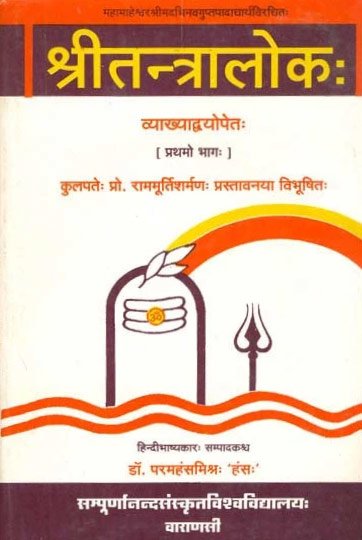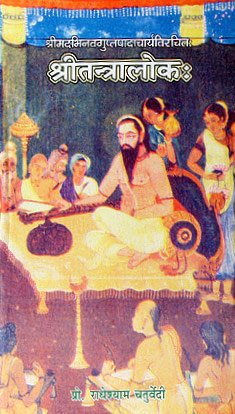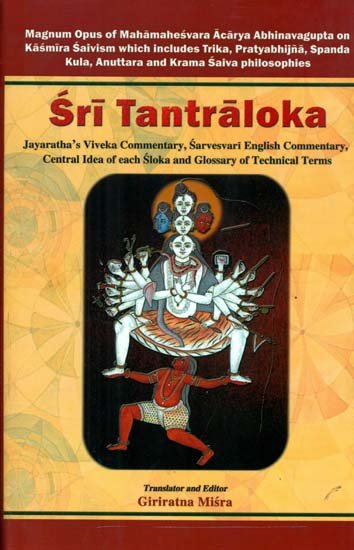Tantraloka [sanskrit text]
by Jun Takashima | 2020 | 46,255 words
The Sanskrit text of the Tantraloka of Abhinavagupta including grammatical analysis, English glossary and comparative print editions. The Tantraloka (“light on Tantra”) was written by Abhinavagupta in the 10th century in Kashmir and represents a major Encyclopedic work in Shaivism dealing with many core aspects and terminology.
Verse 26.64
कृत्वाधारधरां चमत्कृतिरसप्रोक्षाक्षणक्षालितामात्तैर्मानसतः स्वभावकुसुमैः स्वामोदसन्दोहिभिः ।
आनन्दामृतनिर्भरस्वहृदयानर्घार्घपात्रक्रमात् त्वां देव्या सह देहदेवसदने देवार्चयेऽहर्निशम् ॥ ६४ ॥
kṛtvādhāradharāṃ camatkṛtirasaprokṣākṣaṇakṣālitāmāttairmānasataḥ svabhāvakusumaiḥ svāmodasandohibhiḥ |
ānandāmṛtanirbharasvahṛdayānarghārghapātrakramāt tvāṃ devyā saha dehadevasadane devārcaye'harniśam || 64 ||
The English translation of Tantraloka Verse 26.64 is contained in the book Sri Tantraloka by Satya Prakash Singh & Swami Maheshvarananda. This book is not available online so in order to read the full text and translation you should buy the book:
Buy now! English translation by Satya Prakash Singh & Swami Maheshvarananda (2015)
Glossary of Sanskrit terms
Note: This extracts Sanskrit terms and links to English definitions from the glossary, based on an experimental segmentation of verse (26.64). Some terms could be superfluous while some might not be mentioned. Click on the word to show English definitions.
Kritva, Kritvan, Adhara, Dhara, Camatkriti, Proksha, Akshana, Kshalita, Atta, Manasa, Tas, Svabhava, Kusuma, Sva, Svan, Amoda, Sat, Dohin, Anandamrita, Nirbhara, Ahridaya, Argha, Arghapatra, Kramat, Krama, Tva, Yushmad, Devi, Devya, Saha, Dehada, Vasat, Ana, Ani, Deva, Devri, Devan, Arci, Aharnisha,
Analysis of Sanskrit grammar
Note: this is an experimental feature and only shows the first possible analysis of the Sanskrit text (Tantraloka Verse 26.64). If the system was successful in segmenting the sentence, you will see of which words it is made up of, generally consisting of Nouns, Pronouns, Verbs, Participles and Indeclinables. Click on the link to show all possible derivations of the word.
- Line 1: “kṛtvādhāradharāṃ camatkṛtirasaprokṣākṣaṇakṣālitāmāttairmānasataḥ svabhāvakusumaiḥ svāmodasandohibhiḥ ”
- kṛtvā -
-
kṛtvā (indeclinable)[indeclinable]kṛtvan (noun, masculine)[compound], [nominative single]kṛtvan (noun, neuter)[compound], [adverb], [nominative single], [vocative single], [accusative single]√kṛ -> kṛtvā (absolutive)[absolutive from √kṛ]√kṛ -> kṛtvā (absolutive)[absolutive from √kṛ]√kṛ -> kṛtvā (absolutive)[absolutive from √kṛ]√kṛ -> kṛtvā (absolutive)[absolutive from √kṛ]
- ādhāra -
-
ādhāra (noun, masculine)[compound], [vocative single]
- dharām -
-
dharā (noun, feminine)[accusative single]
- camatkṛtir -
-
camatkṛti (noun, feminine)[nominative single]
- asa -
-
asan (noun, neuter)[compound]
- prokṣā -
-
prokṣa (noun, masculine)[compound], [vocative single]
- akṣaṇa -
-
akṣaṇa (noun, masculine)[compound], [vocative single]akṣaṇa (noun, neuter)[compound], [vocative single]
- kṣālitām -
-
kṣālitā (noun, feminine)[accusative single]
- āttair -
-
ātta (noun, masculine)[instrumental plural]ātta (noun, neuter)[instrumental plural]
- mānasa -
-
mānasa (noun, masculine)[compound], [vocative single]mānasa (noun, neuter)[compound], [vocative single]
- taḥ -
-
tas (noun, masculine)[compound], [vocative single]tas (noun, neuter)[compound], [nominative single], [vocative single], [accusative single]ta (noun, masculine)[nominative single]
- svabhāva -
-
svabhāva (noun, masculine)[compound], [vocative single]
- kusumaiḥ -
-
kusuma (noun, masculine)[instrumental plural]kusuma (noun, neuter)[instrumental plural]
- svā -
-
sū (noun, masculine)[compound], [adverb], [vocative single]sū (noun, neuter)[compound], [adverb], [nominative single], [vocative single], [accusative single]sū (noun, feminine)[compound], [adverb], [vocative single]so (noun, feminine)[adverb]sva (noun, neuter)[compound], [vocative single]svan (noun, masculine)[compound], [nominative single]svan (noun, neuter)[compound], [adverb], [nominative single], [accusative single]sva (noun, masculine)[vocative single]svā (noun, feminine)[nominative single]
- āmoda -
-
āmoda (noun, masculine)[compound], [vocative single]āmoda (noun, neuter)[compound], [vocative single]
- san -
-
sa (noun, neuter)[adverb]sat (noun, masculine)[nominative single], [vocative single]
- dohibhiḥ -
-
dohin (noun, masculine)[instrumental plural]dohin (noun, neuter)[instrumental plural]
- Line 2: “ānandāmṛtanirbharasvahṛdayānarghārghapātrakramāt tvāṃ devyā saha dehadevasadane devārcaye'harniśam ”
- ānandāmṛta -
-
ānandāmṛta (noun, neuter)[compound], [vocative single]
- nirbhara -
-
nirbhara (noun, masculine)[compound], [vocative single]nirbhara (noun, neuter)[compound], [vocative single]
- sva -
-
sū (noun, masculine)[compound], [adverb], [vocative single]sū (noun, neuter)[compound], [adverb], [nominative single], [vocative single], [accusative single]sū (noun, feminine)[compound], [adverb], [vocative single]so (noun, feminine)[adverb]sva (noun, neuter)[compound], [vocative single]svan (noun, masculine)[compound]svan (noun, neuter)[compound], [adverb], [nominative single], [accusative single]sva (noun, masculine)[vocative single]
- ahṛdayān -
-
ahṛdaya (noun, masculine)[accusative plural]
- arghā -
-
argha (noun, masculine)[compound], [vocative single]√argh (verb class 1)[imperative active second single]
- arghapātra -
-
arghapātra (noun, neuter)[compound], [vocative single]
- kramāt -
-
kramāt (indeclinable)[indeclinable]krama (noun, masculine)[adverb], [ablative single]
- tvām -
-
tvā (noun, feminine)[accusative single]yuṣmad (pronoun, none)[accusative single]
- devyā -
-
devī (noun, feminine)[instrumental single]√dīv -> devyā (participle, feminine)[nominative single from √dīv]
- saha -
-
saha (indeclinable postposition)[indeclinable postposition]saha (noun, masculine)[compound], [vocative single]saha (noun, neuter)[compound], [vocative single]√sah (verb class 1)[imperative active second single]
- dehade -
-
dehada (noun, masculine)[locative single]
- vasad -
-
√vas -> vasat (participle, neuter)[nominative single from √vas class 1 verb], [vocative single from √vas class 1 verb], [accusative single from √vas class 1 verb]
- ane -
-
ana (noun, masculine)[locative single]ani (noun, masculine)[vocative single]
- devā -
-
deva (noun, masculine)[compound], [vocative single]deva (noun, neuter)[compound], [vocative single]devan (noun, masculine)[compound], [nominative single]devā (noun, feminine)[nominative single]devṛ (noun, masculine)[nominative single]√div (verb class 1)[imperative active second single]
- arcaye' -
-
arci (noun, masculine)[dative single]√ṛc (verb class 0)[present middle first single]√ṛc (verb class 0)[present middle first single]
- aharniśam -
-
aharniśa (noun, neuter)[adverb], [nominative single], [accusative single]
Other editions:
Also see the following editions of the Sanskrit text or (alternative) English translations of the Tantraloka Verse 26.64
Sri Tantraloka (Set of 8 Volumes)
by Paramahansa Mishra (2000)
[श्री तन्त्रालोकः (संस्कृत एवं हिंदी अनुवाद)] Sanskrit Text with Hindi Translation; Published by Sampurnanand Sanskrit University; With two commentaries: Viveka (विवेक) by Ācārya Śrī Jayaratha and Nīrakṣīraviveka (नीरक्षीरविवेक) by Paramhans Mishra.
Buy now!
Tantraloka of Abhinavagupta (with Jnanavati Hindi commentary)
by Radheshyam Chaturvedi (2002)
[आचार्य अभिनवगुप्त द्वारा रचित तंत्रलोक: संस्कृत एवम् हिन्दी अनुवाद (पाँच खंडों में)] Sanskrit Text with Hindi Translation and Commentary; Published by Chaukhambha Vidya Bhawan.
Buy now!
Sri Tantraloka of Abhinavagupta
by Giriratna Misra (2018)
With Viveka Saṃskṛta Commentary by Rājānaka Jayaratha; Sanskrit Text, Transliteration, Sarveshwari English commentary; With Glossary and Central Idea of Each Śloka; Published by Chaukhamba Surbharati Prakashan
Buy now!![Tantraloka [sanskrit text] - book cover](/uploads/a/Tantraloka-Sanskrit.jpg)


